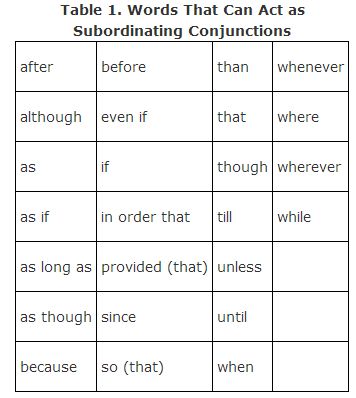Conjunctions are words that join or link elements. Like prepositions, they get a job done rather than add excitement to a sentence. But choosing the right conjunction makes the logic of your thoughts clear. For example, which of the following two sentences creates the more logical connection?
I've always disliked history class,
and I have never failed a test.
I've always disliked history class,
but I have never failed a test.
In the second sentence, the two clauses suggest contradictory ideas: but provides a more logical connection than and.
Coordinating conjunctions
The coordinating conjunctions are and, but, for, nor, or, so, and yet. These conjunctions join words, phrases, or clauses that are grammatically equal in rank.
-
Words: Mother
and daughter, tea
and toast
-
Phrases: We found cake crumbs all over the kitchen table
and on the floor.
-
Clauses: He likes me,
but I don't care.
Each clause ( He likes me and I don't care) can stand alone as a complete sentence. The two clauses are grammatically equal.
Correlative conjunctions
Correlative conjunctions are like coordinating conjunctions except that they come in matched pairs: either/or, neither/nor, both/and, not only/but also, and whether/or.
-
Words:
Neither mother
nor daughter
-
Phrases: We found cake crumbs
not only all over the kitchen table
but also on the floor.
-
Clauses:
Either you surrender
or we'll shoot.
Subordinating conjunctions
Subordinating conjunctions join unequal elements. A subordinating conjunction joins a clause that can't stand alone (called a subordinate or dependent clause) to a clause that can (called an independent clause).
We will discontinue research in this area
unless the results of the experiment are promising.
The clause beginning with unless cannot stand alone; it is subordinate to, or dependent on, the independent clause We will discontinue research in this area. Unless is the subordinating conjunction that links the two clauses.
The train arrived
before we did.
Before we did is a dependent clause; it cannot stand alone. It depends on the independent clause The train arrived. Before is the subordinating conjunction that links the clauses.
Table 1 lists words that can act as subordinating conjunctions.

You may notice that some of these words were also on the list of prepositions. Remember that a word's part of speech depends on its function, not on the word itself. A preposition shows a relationship between words and has an object, whereas a subordinating conjunction joins a dependent clause to an independent one.
The man stood hesitantly before the door.
|
|
|
|
|
|
In the preceding sentence, before is a preposition (meaning in front of); its object is door. The preposition shows the relationship between the man and the door.
|
|
|
|
|
|
Before the expedition can begin, the details must be addressed.
|
|
|
|
|
|
In the sentence above, before is a subordinating conjunction, linking the dependent clause Before the expedition can begin to the independent clause the details must be addressed.
|
|
|
|
|
|